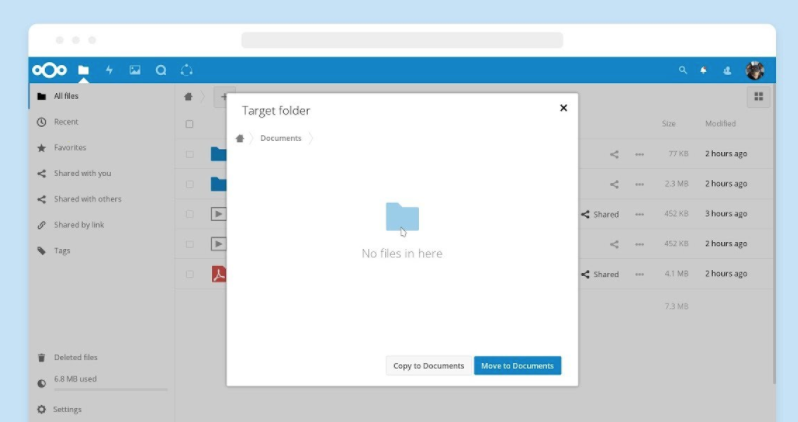Deploy NextCloudPi(ncp) docker on aarch64 board
在Arm64或aarch64架构的板卡上使用Docker布署NextCloudPi云盘服务
About "arm64 vs aarch64", just Google it.


Reference:
- Get started with NextCloudPi (ncp) installation via docker: https://docs.nextcloudpi.com/en/how-to-get-started-with-ncp-docker/
- Docker installation, on aarch64, ref: https://www.cnblogs.com/sonictl/p/12909874.html
1. Install ncp with docker:
If you wanna firstly have a taste in LAN network env.:
docker run -d -p 4443:4443 -p 443:443 -p 80:80 -v ncdata:/data --name nextcloudpi ownyourbits/nextcloudpi 127.0.0.1
If you have a domain name:
docker run -d -p 4443:4443 -p 443:443 -p 80:80 -v ncdata:/data --name nextcloudpi ownyourbits/nextcloudpi $YOUR_Domain
2. Some useful commands for work with docker:
We recommend to firstly read all the content below, and pick commands for your need during configuration. The procedures of configuration is roughly as below:
Enter the container:
docker exec -it <container name> /bin/bash
docker exec -it 6ef91daa0481 /bin/bash
Set the timeZone same with host:
Note: failing synchronizing the timezone of docker-container and host may lead Authorization Fatal
This is a big entraping‼️ 😭
cp /usr/share/zoneinfo/PRC /etc/localtime
docker exec -it 6ef91daa0481 date
docker exec -it 6ef91daa0481 /bin/bash
Install vim for container
You may need to configure config/config.php, but we recommend to use ncp-config as below.
apt-get update
apt-get install vim
vim /var/www/nextcloud/config/config.php
docker exec -it nextcloudpi ncp-config #WARNING: note the '_' everywhere in 'ncp-config'!!
ref: https://help.nextcloud.com/t/reset-password-ncp/74207/12
Enlarge the volume for '/var/lib/docker' directory
WARNING: data may get lost. Do this if you have no data in your ncp account. Do it on your own risk.
WARNING: data may get lost. Do this if you have no data in your ncp account. Do it on your own risk.
ref: https://forums.docker.com/t/how-to-change-var-lib-docker-directory-with-overlay2/43620/9
- make the new folder on the other volume, e.g. you mount your Mess-storage HardDisk /sda1 on /data
- stop the docker daemon,
- move everything, e.g.
cp -avr /var/lib/docker/ /data/lib/ - Edit the file /etc/docker/daemon.json and add or modfy the “data-root” entry.
If you configuration is empty, the file will look like this:
{
"data-root": "/data/lib/docker"
}
- Stop the docker daemon by
systemd stop docker - modify the configuration file for containers: /data/lib/docker/containers/
/config.vs.json. At the source:, make it into your new path. - start the docker daemon.
- Check
- Check by:
# docker info | grep Root && docker ps -a && docker image ls - start the docker container
If you meet the data-lost error, just change"data-root": "/data/lib/docker"back.
- Check by:
If you meet the error below:
Error response from daemon: error evaluating symlinks from mount source "/var/lib/docker/volumes/esdata/_data": lstat /var/lib/docker: no such file or directoryref links and modify the configuration of docker container.
ref link1: meet error after moving docker root
ref link2: change container configuration
ref link3: how to format json file in vim
set the frpc for exposing the local service to public Internet
- Check the port occupation:
# lsof -i -P -n | grep LISTEN
docker-pr 9168 root 4u IPv6 120391 0t0 TCP *:4443 (LISTEN)
docker-pr 9183 root 4u IPv6 119704 0t0 TCP *:443 (LISTEN)
docker-pr 9197 root 4u IPv6 122113 0t0 TCP *:80 (LISTEN)
-
config
frpc:vim /etc/frp/frpc.iniIf you're not familiar frp(frps & frpc), learn and be practised about it.
e.g.
remote: 8282
local: 80
-
domain name recored: map
cloud.yourdomain.comto the IP of frps's host. -
in frps's host, add host
cloud.yourdomain.comto8282:vim /etc/caddy/CaddyfileCaddy 自动https,确实很香啊~!Nginx 的反向代理配置啥的,这里就按下不表了哈~
cloud.yourdomain.com {
gzip
log stdout
proxy / localhost:8282 { # ncp, frp 8282 - > 80 @ armbian_chanidBox
websocket
transparent
}
}
-
Add the LAN_IP; Domain; 127.0.0.1 into the trust domain list of ncp:
add the domain
cloud.yourdomain.comdocker exec -it nextcloudpi ncp-config
Start docker container automatically.
You may need the container get started automatically for cases such as interrupted. There are two ways I can find:
- use `docker run -d --restart <flag> <container_name>` when you pull the image and build the container at the first time. [ref link](https://docs.docker.com/config/containers/start-containers-automatically/)
- create a systemd service on host. [ref link](https://blog.container-solutions.com/running-docker-containers-with-systemd)
The example content of /etc/systemd/system/docker.nextcloudpi.service
[Unit]
Description=nextCloudPi Container
After=docker.service
Requires=docker.service
After=frpc.service
Requires=frpc.service # if you use frpc for exposing the local service to public Internet
[Service]
TimeoutStartSec=30
ExecStart=/usr/bin/docker start nextcloudpi
[Install]
WantedBy=multi-user.target
enable this service run on boot: sudo systemctl enable docker.nextcloudpi.service. Note this .service file may cause fail. test it by reboot your host.
Stop Auto-start container:
$ docker update --restart unless-stopped <container_name>, change theunless-stoppedintono- and modify the
/etc/systemd/system/docker.nextcloudpi.service
create new nextCloud user:
NextCloud does not support users to register themselves? Funny...
Tips:
Different Quota options - configure?
The options for user quotas are "Default", "Unlimited", 1GB, 5GB and 10GB. If you'd like to be able to set a 25GB, just type in your own quota in. e.g. 1TB limit just type in "1TB". ref_link
What http server does ncp use?
try systemctl status apache2 in ncp container's bash
manually stopping the daemon of apache2:
# systemctl stop apache2
# systemctl disable apache2
What if install ncp via curl command
We can now install NextCloudPi in any Debian Buster system of any architecture with:
# curl -sSL https://raw.githubusercontent.com/nextcloud/nextcloudpi/master/install.sh | bash
before running above, may need to copy the nc-app and nc-web, ref: https://github.com/nextcloud/nextcloudpi/issues/976
before running above, may need to configure the debian source.list
 Quick Retrieve on Google
Quick Retrieve on Google Quick Retrieve on Bing
Quick Retrieve on Bing

 浙公网安备 33010602011771号
浙公网安备 33010602011771号